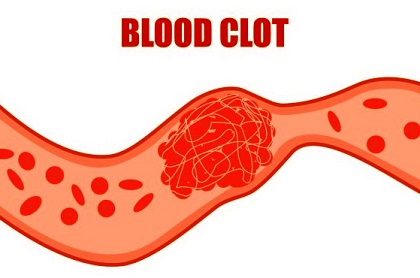MLL1 Enzyme Identified as Key Driver of Blood Clotting Risks in Severe COVID-19 Cases
Nikhil Prasad Fact checked by:Thailand Medical News Team Oct 28, 2024 1 year, 3 months, 2 weeks, 2 days, 21 hours, 44 minutes ago
Medical-News: University of Michigan researchers, in collaboration with Hartland High School in Michigan, have made a breakthrough in understanding why some COVID-19 patients experience severe blood clotting issues. This clotting, known as "immunothrombosis," is triggered by an immune response in the blood vessels, posing serious risks during SARS-CoV-2 infections. Led by Nathaniel Parchment, Sriganesh Sharma, and Andrea T. Obi, the research team focused on a particular enzyme, KMT2A (also known as MLL1), to understand its role in the inflammation and clotting seen in COVID-19 cases.
 MLL1 Enzyme Identified as Key Driver of Blood Clotting Risks in Severe COVID-19 Cases
Blood Vessels and Clotting Risks in COVID-19
MLL1 Enzyme Identified as Key Driver of Blood Clotting Risks in Severe COVID-19 Cases
Blood Vessels and Clotting Risks in COVID-19
COVID-19 doesn’t just affect the lungs; it has far-reaching effects on various organs due to the virus's impact on blood vessels, especially the endothelial cells lining these vessels. The research team observed how endothelial cells change in response to COVID-19 infection. Endothelial cells are vital for smooth blood flow, but in COVID-19 cases, they show increased adhesion molecules (CAMs) and procoagulant molecules (PCMs). These changes make it easier for immune cells to stick to blood vessel walls, increasing the risk of blood clots.
This
Medical News report examines the findings in greater detail, particularly how MLL1, an enzyme involved in gene regulation, influences endothelial cell response during COVID-19 infections. The team hypothesized that MLL1 might play a central role by triggering inflammatory processes in endothelial cells, leading to an increased clotting risk in severe COVID-19 cases.
How Researchers Studied MLL1’s Role in Clotting
To investigate MLL1's role, the team turned to advanced molecular techniques. They analyzed human lung cells from patients who had fatal COVID-19 infections and examined their gene activity. Their analysis showed a marked increase in MLL1 activity in these cells. Additionally, they exposed mouse and human vein cells to either a similar virus (murine beta-coronavirus) or the COVID-19 spike protein and noted significant increases in the expression of MLL1, CAMs, and PCMs.
The team tested ways to reduce MLL1 activity in infected cells by using inhibitors and small interfering RNA (siRNA) technology to silence MLL1 gene expression. Remarkably, this silencing led to a decrease in both CAM and PCM levels. This reduction effectively lowered the adhesion of immune cells to endothelial cells, suggesting that MLL1 plays a major role in how the immune system and blood clotting respond to COVID-19 infection.
Why MLL1 Could Be a Game-Changer in Treating COVID-19-Related Clotting
In severe COVID-19 cases, the body’s immune response can cause blood clotting, which in turn damages tissues and organs. The study’s findings imply that by targeting MLL1, it might be possible to control this process. Since MLL1 regulates the production of CAMs and PCMs, suppressing its activity could decrease clotting w
ithout the bleeding risks associated with common anticoagulants. Current blood thinners can be risky for COVID-19 patients as they might lead to excessive bleeding. Thus, a drug targeting MLL1 could be a safer option to prevent clotting while minimizing bleeding risks.
Conclusion: A Path Toward Safer COVID-19 Treatments
The study marks a promising step toward finding safer treatments for COVID-19-related complications. By focusing on MLL1, researchers are looking at a novel pathway that could reduce clotting without compromising patient safety. This approach could pave the way for drugs that help COVID-19 patients with severe inflammation and clotting issues, potentially saving lives and reducing the strain on healthcare systems during pandemics.
As Catherine Luke from Hartland High School noted, understanding the molecular mechanisms behind COVID-19-related clotting can change how we approach and treat other infectious diseases in the future. With these findings, researchers hope that MLL1 could be used as a new therapeutic target, providing a tailored approach to managing the immunothrombotic risks that can make COVID-19 so dangerous.
The study findings were published in the peer-reviewed Journal of Vascular Surgery Science.
https://www.sciencedirect.com/science/article/pii/S2666350324000579
For the latest COVID-19 News, keep on logging to Thailand
Medical News.
Read Also:
https://www.thailandmedical.news/news/russian-study-provides-insights-of-immunothrombosis-in-covid-19
https://www.thailandmedical.news/news/thymidine-phosphorylase-identified-as-key-driver-of-spike-protein-induced-blood-clots-in-covid-19
